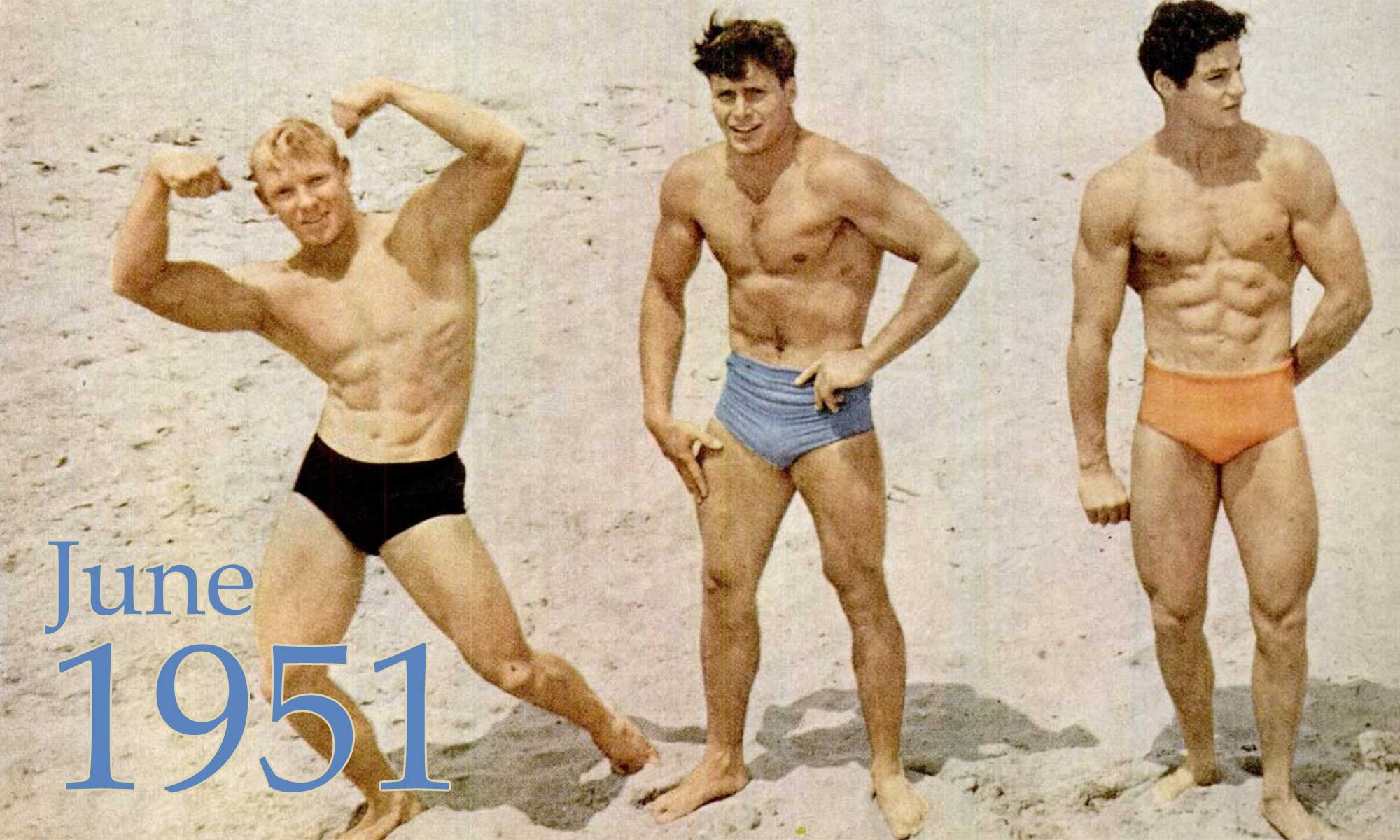| ◄ JUNE ► | ||||||
|---|---|---|---|---|---|---|
| ◄ 1951 ► | ||||||
| 1 | 2 | |||||
| 3 | 4 | 5 | 6 | 7 | 8 | 9 |
| 10 | 11 | 12 | 13 | 14 | 15 | 16 |
| 17 | 18 | 19 | 20 | 21 | 22 | 23 |
| 24 | 25 | 26 | 27 | 28 | 29 | 30 |
| President: | Harry S Truman (D) | |||
| Vice-President: | Alben W. Barkley (D) | |||
| House: | 232 (D) | 200 (R) | 1 (Other) | 2 (Vacant) |
| Southern states: | 103 (D) | 2 (R) | ||
| Senate: | 50 (D) | 46 (R) | ||
| Southern states: | 22 (D) | |||
| GDP growth: | 7.3% | (Annual) | ||
| 2.1% | (Quarterly) | |||
| Inflation: | 8.8% | |||
| Unemployment: | 5.0% | |||
| US killed in action, | 935 | (This month) | ||
| Korean conflict: | 21,978 | (Since Jun 28, 1950) | ||
![]() Jun 4: The U.S. Supreme Court rules that the First Amendment rights to free speech, the press and assembly don’t apply when engaged in a plot to overthrow the government. The 6-2 decision in Dennis v. United States upholds the conviction under the Smith Act of eleven leaders of the Communist Party of the U.S.A., including Eugene Dennis, the party’s General Secretary. At the criminal trial in Federal Court, the prosecutor asserted that the defendants did not need to have a specific plan to overthrow the government, but that the CPUSA’s general philosophy advocated a violent revolution. Justice Hugo Black dissents: “They were not charged with overt acts of any kind designed to overthrow the Government. They were not even charged with saying anything or writing anything designed to overthrow the Government. The charge was that they agreed to assemble and to talk and publish certain ideas at a later date. … [T]his is a virulent form of prior censorship of speech and press, which I believe the First Amendment forbids. … There is hope, however, that in calmer times, when present pressures, passions and fears subside, this or some later Court will restore the First Amendment liberties to the high preferred place where they belong in a free society.” The decision will be effectively overturned in 1956 and 1960. Until then, Dennis will encourage another round of mass arrests and prosecutions.
Jun 4: The U.S. Supreme Court rules that the First Amendment rights to free speech, the press and assembly don’t apply when engaged in a plot to overthrow the government. The 6-2 decision in Dennis v. United States upholds the conviction under the Smith Act of eleven leaders of the Communist Party of the U.S.A., including Eugene Dennis, the party’s General Secretary. At the criminal trial in Federal Court, the prosecutor asserted that the defendants did not need to have a specific plan to overthrow the government, but that the CPUSA’s general philosophy advocated a violent revolution. Justice Hugo Black dissents: “They were not charged with overt acts of any kind designed to overthrow the Government. They were not even charged with saying anything or writing anything designed to overthrow the Government. The charge was that they agreed to assemble and to talk and publish certain ideas at a later date. … [T]his is a virulent form of prior censorship of speech and press, which I believe the First Amendment forbids. … There is hope, however, that in calmer times, when present pressures, passions and fears subside, this or some later Court will restore the First Amendment liberties to the high preferred place where they belong in a free society.” The decision will be effectively overturned in 1956 and 1960. Until then, Dennis will encourage another round of mass arrests and prosecutions.
![]()
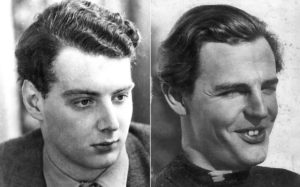 Jun 7: The British Foreign Office discloses that two high and trusted diplomats are missing and are being sought on the Continent on suspicions that they are on their way to the Soviet Union. Guy Burgess and Donald MacLean have been absent without leave since May 25.
Jun 7: The British Foreign Office discloses that two high and trusted diplomats are missing and are being sought on the Continent on suspicions that they are on their way to the Soviet Union. Guy Burgess and Donald MacLean have been absent without leave since May 25.
![]() Jun 7: Five German former SS officers are executed by hanging for their role in mobile death squads in Nazi-occupied eastern Europe. Two other SS officers are hanged for war crimes committed in concentration camps.
Jun 7: Five German former SS officers are executed by hanging for their role in mobile death squads in Nazi-occupied eastern Europe. Two other SS officers are hanged for war crimes committed in concentration camps.
![]() Jun 10: The Iranian government’s interim three-man board of directors arrive in Abadan to prepare to nationalize the Iranian assets of British-owned Anglo-Iranian Oil Company (AIOC). Tumultuous crowds greet their arrival with slaughtered cows and sheep. Local AIOC officials say they will meet with the board the next day.
Jun 10: The Iranian government’s interim three-man board of directors arrive in Abadan to prepare to nationalize the Iranian assets of British-owned Anglo-Iranian Oil Company (AIOC). Tumultuous crowds greet their arrival with slaughtered cows and sheep. Local AIOC officials say they will meet with the board the next day.
![]() Jun 14: Iran presents Britain with an ultimatum to turn over Iran’s 75% share of the profits made since March 20 by the British-owned Anglo-Iranian Oil Company, as specified by Iran’s nationalization law passed on that date. British officials are taken aback by the demand. British Foreign Secretary Herbert Morrison tells the House of Commons that British attempts to negotiate with Iran has been impeded by Iran’s hasty actions and a campaign of vilification. He especially criticizes a three-man committee appointed by the Iranian government to guide the nationalization process. He says that progress cannot be made “if the atmosphere is vitiated by precipitate Persian action in the oil fields.”
Jun 14: Iran presents Britain with an ultimatum to turn over Iran’s 75% share of the profits made since March 20 by the British-owned Anglo-Iranian Oil Company, as specified by Iran’s nationalization law passed on that date. British officials are taken aback by the demand. British Foreign Secretary Herbert Morrison tells the House of Commons that British attempts to negotiate with Iran has been impeded by Iran’s hasty actions and a campaign of vilification. He especially criticizes a three-man committee appointed by the Iranian government to guide the nationalization process. He says that progress cannot be made “if the atmosphere is vitiated by precipitate Persian action in the oil fields.”
![]() Jun 19: President Truman signs into law a bill extending the draft to July 1, 1955. The bill lowers the draft age from 19 to 18½ years, and authorizes the creation of a Universal Military Training for all 18-year-old men for the first time in the nation’s history.
Jun 19: President Truman signs into law a bill extending the draft to July 1, 1955. The bill lowers the draft age from 19 to 18½ years, and authorizes the creation of a Universal Military Training for all 18-year-old men for the first time in the nation’s history.
![]()
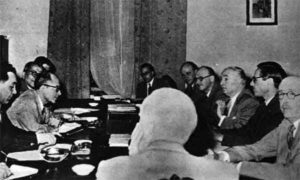 Jun 19: The Abadan crisis escalates dramatically when Iran rejects a £10 million offer (£330 million today) offer from the British-owned Anglo-Iranian Oil Company. The offer is in response to Iran’s June 14 demand that AIOC turns over 75% share of its profits made since March 20 as specified by Iran’s nationalization law. The £10 million sum, which is far lower than what the Iranians are expecting, is offered “as an advance against any sum which may become due to the Government as a results of eventual agreement … and on the understanding that the Government undertakes not to interfere with the company’s operations while discussions are proceeding.” The note closes by calling Iran’s demand “unjustifiable.” Iran rejects the offer as inconsistent with its nationalization law, while Britain complains that the confusing and poorly-defined law had been “hastily drafted” and cannot be complied with. Iran then breaks off talks.
Jun 19: The Abadan crisis escalates dramatically when Iran rejects a £10 million offer (£330 million today) offer from the British-owned Anglo-Iranian Oil Company. The offer is in response to Iran’s June 14 demand that AIOC turns over 75% share of its profits made since March 20 as specified by Iran’s nationalization law. The £10 million sum, which is far lower than what the Iranians are expecting, is offered “as an advance against any sum which may become due to the Government as a results of eventual agreement … and on the understanding that the Government undertakes not to interfere with the company’s operations while discussions are proceeding.” The note closes by calling Iran’s demand “unjustifiable.” Iran rejects the offer as inconsistent with its nationalization law, while Britain complains that the confusing and poorly-defined law had been “hastily drafted” and cannot be complied with. Iran then breaks off talks.
![]() Jun 20: Twenty-one Communist party leaders in New York City are indicted and charged with criminal conspiracy to teach and advocate the overthrow of the U.S. government. These indictments and arrests are part of a second wave of prosecutions under the Smith Act that will see the indictment of sixty-eight second-tier Communists in 1951.
Jun 20: Twenty-one Communist party leaders in New York City are indicted and charged with criminal conspiracy to teach and advocate the overthrow of the U.S. government. These indictments and arrests are part of a second wave of prosecutions under the Smith Act that will see the indictment of sixty-eight second-tier Communists in 1951.
![]() Jun 21: Iranian Prime Minister Mohammed Mossadegh appears before the Majlis for the first time since May 13 and calls for votes of confidence for his nationalization plan from both houses of parliament. Lawmakers respond with unanimous backing. That same day, the AIOC’s public relations office in Tehran and its operations at Kermanshah are taken over. In Abadan, Hussein Makki, head of the three-man takeover board, presents a new list of demands to the local manager, and threatens to cut off the oil supply to the refinery if his demands aren’t met. Britain warns that such a cutoff will result in a mass resignation of British technicians and managers. Sir Francis Shepherd, Britain’s Ambassador to Iran, says that there is now “no hope of resumption of oil negotiations” as long as “the Mossadegh Government is in power.” British Prime Minister Clement Attlee says his government remains in favor of keeping British oil technicians and experts in Iran as long as possible to keep the operations running safely.
Jun 21: Iranian Prime Minister Mohammed Mossadegh appears before the Majlis for the first time since May 13 and calls for votes of confidence for his nationalization plan from both houses of parliament. Lawmakers respond with unanimous backing. That same day, the AIOC’s public relations office in Tehran and its operations at Kermanshah are taken over. In Abadan, Hussein Makki, head of the three-man takeover board, presents a new list of demands to the local manager, and threatens to cut off the oil supply to the refinery if his demands aren’t met. Britain warns that such a cutoff will result in a mass resignation of British technicians and managers. Sir Francis Shepherd, Britain’s Ambassador to Iran, says that there is now “no hope of resumption of oil negotiations” as long as “the Mossadegh Government is in power.” British Prime Minister Clement Attlee says his government remains in favor of keeping British oil technicians and experts in Iran as long as possible to keep the operations running safely.
![]()
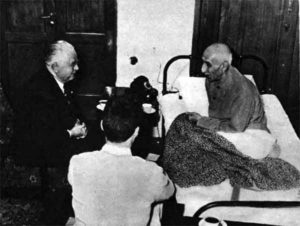 Jun 22: Iranian Prime Minister Mohammed Mossadegh meets with U.S. Ambassador Henry Grady anmd asks the U.S. for a $25 million loan ($245 million today) to prevent Iran’s economy from collapsing. The loan had already been available from the U.S. Export-Import Bank since January, but the Iranian Parliament had not yet ratified the loan. The loan, however, had been approved by the Bank on the basis of uninterrupted oil revenues. Those revenues are now in doubt. Iran is demanding that oil tankers being loaded at Abadan sign receipts naming the Iranian Oil Company as the owners of the oil and directing payments to the national company instead of the Anglo-Iranian Oil Company. AIOC and the tankers’ captains, most of whom work for AIOC subsidiaries in London, warn that customers will not honor those receipts and refuse to sign them. This brings all petroleum exports from Iran to a halt.
Jun 22: Iranian Prime Minister Mohammed Mossadegh meets with U.S. Ambassador Henry Grady anmd asks the U.S. for a $25 million loan ($245 million today) to prevent Iran’s economy from collapsing. The loan had already been available from the U.S. Export-Import Bank since January, but the Iranian Parliament had not yet ratified the loan. The loan, however, had been approved by the Bank on the basis of uninterrupted oil revenues. Those revenues are now in doubt. Iran is demanding that oil tankers being loaded at Abadan sign receipts naming the Iranian Oil Company as the owners of the oil and directing payments to the national company instead of the Anglo-Iranian Oil Company. AIOC and the tankers’ captains, most of whom work for AIOC subsidiaries in London, warn that customers will not honor those receipts and refuse to sign them. This brings all petroleum exports from Iran to a halt.
![]() Jun 22: U.N. forces continue their drive north of the 38th parallel when they push Chinese and North Korean troops out of Kaesong, the last major communist stronghold south of the 38th Parallel.
Jun 22: U.N. forces continue their drive north of the 38th parallel when they push Chinese and North Korean troops out of Kaesong, the last major communist stronghold south of the 38th Parallel.
![]() Jun 23: The Soviet Union calls for truce talks to begin. The U.S. State Department cautiously says that if the proposal “is more than propaganda,” then the U.S. is willing to participate.
Jun 23: The Soviet Union calls for truce talks to begin. The U.S. State Department cautiously says that if the proposal “is more than propaganda,” then the U.S. is willing to participate.
![]() Jun 23: Nat King Cole’s single “Too Young” begins its five week run at number one.
Jun 23: Nat King Cole’s single “Too Young” begins its five week run at number one.
![]() Jun 24: U.N. Secretary General Trygve Lie calls for cease-fire negotiations in Korea. His appeal is a follow-up to the surprise Soviet proposal of the day before. The U.S. remains cautious and seeks a Soviet demonstration of good faith.
Jun 24: U.N. Secretary General Trygve Lie calls for cease-fire negotiations in Korea. His appeal is a follow-up to the surprise Soviet proposal of the day before. The U.S. remains cautious and seeks a Soviet demonstration of good faith.
![]() Jun 25: The People’s Republic of China endorses the Soviet proposal for truce talks through a lengthy editorial published in The People’s Daily. But the editorial appears to lay down an unrealistic condition: “All foreign troops should be withdrawn from Korea and the Korean people should be allowed to settle the Korean question themselves.”
Jun 25: The People’s Republic of China endorses the Soviet proposal for truce talks through a lengthy editorial published in The People’s Daily. But the editorial appears to lay down an unrealistic condition: “All foreign troops should be withdrawn from Korea and the Korean people should be allowed to settle the Korean question themselves.”
![]() Jun 25: British women, including nurses and Anglo-Iranian Oil Company employees, and other dependents and children are being voluntarily evacuating from Iran. Britain warns that it may be forced to evacuate its 2,800 technicians from Abadan unless Iranian pressure on them ends. The worst of the pressure is in the form of an anti-sabotage law being considered by the Majlis. The law would provide stern penalties, including possibly death, for anyone committing any action that would result in lower oil production. The offense would be tried in military courts, which does not allow for appeals. A government official in Abadan says that British technicians are free to leave Iran, but if their departure results in a drop in production it would be considered a form of sabotage. The British government responds by ordering a cruiser in the Persian Gulf to move towards Abadan.
Jun 25: British women, including nurses and Anglo-Iranian Oil Company employees, and other dependents and children are being voluntarily evacuating from Iran. Britain warns that it may be forced to evacuate its 2,800 technicians from Abadan unless Iranian pressure on them ends. The worst of the pressure is in the form of an anti-sabotage law being considered by the Majlis. The law would provide stern penalties, including possibly death, for anyone committing any action that would result in lower oil production. The offense would be tried in military courts, which does not allow for appeals. A government official in Abadan says that British technicians are free to leave Iran, but if their departure results in a drop in production it would be considered a form of sabotage. The British government responds by ordering a cruiser in the Persian Gulf to move towards Abadan.
![]()
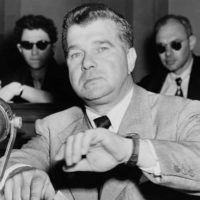 Jun 25: Academy Award-winning director Robert Rossen (All the King’s Men, The Brave Bulls, Body and Soul) is called before the House Un-American Activities Committee. He denies that he is currently a Communist, but pleads the Fifth when asked if he ever had been a Communist in the past. He also refuses to answer several other question about meetings, organizations and individuals. Rossen is blacklisted. His inability to work will bring him back to the HUAC where he will name 57 people as Communists.
Jun 25: Academy Award-winning director Robert Rossen (All the King’s Men, The Brave Bulls, Body and Soul) is called before the House Un-American Activities Committee. He denies that he is currently a Communist, but pleads the Fifth when asked if he ever had been a Communist in the past. He also refuses to answer several other question about meetings, organizations and individuals. Rossen is blacklisted. His inability to work will bring him back to the HUAC where he will name 57 people as Communists.
![]()
 Jun 25: CBS airs the first commercial broadcast program in color. CBS’s color system consists with a disc made of red, blue, and green filters spinning inside the television camera at 1,200 rpm. At the receiving end, a similar disk is mounted in front of the television set’s cathode ray tube, spinning at 1,200 rpm and electronically synchronized with the camera’s disk. Because almost three times as many images needs to be transmitted per second, one for each color, than is currently used in standard black-and-white broadcast, the color broadcast is incompatible with the existing estimated 10 million television sets. Premiere, a special variety program, is broadcast across a five-city hookup: New York, Boston, Philadelphia, Baltimore, and Washington. Because no color television sets are available, CBS distributes twenty receivers to TV studios and a few public places in those five cities. Premiere begins with a five-minute test pattern at 4:30 p.m., followed by Arthur Godfrey, who hosted the first half-hour, and Ed Sullivan for the second half hour. Performers include actors Faye Emerson, Isabel Bigley, and Robert Alda; humorists Sam Levinson, Garry Moore, and Durward Kirby; the Bil Baird marionettes, and members of the New York City Ballet. During the hour-long broadcast, temperatures inside Studio 57 soar to about 120°F (50°C) due to the intense lighting needed for the television camera. Performers swelter, face makeup runs, and the floor of the studio buckles. The icing on a layer cake melts and cherries run out of a cherry pie during commercials. Viewer reactions were generally positive, although observers noted that flesh tones varied considerably when performers moved their heads. CBS will continue color broadcasts for one to two hours daily until October 20.
Jun 25: CBS airs the first commercial broadcast program in color. CBS’s color system consists with a disc made of red, blue, and green filters spinning inside the television camera at 1,200 rpm. At the receiving end, a similar disk is mounted in front of the television set’s cathode ray tube, spinning at 1,200 rpm and electronically synchronized with the camera’s disk. Because almost three times as many images needs to be transmitted per second, one for each color, than is currently used in standard black-and-white broadcast, the color broadcast is incompatible with the existing estimated 10 million television sets. Premiere, a special variety program, is broadcast across a five-city hookup: New York, Boston, Philadelphia, Baltimore, and Washington. Because no color television sets are available, CBS distributes twenty receivers to TV studios and a few public places in those five cities. Premiere begins with a five-minute test pattern at 4:30 p.m., followed by Arthur Godfrey, who hosted the first half-hour, and Ed Sullivan for the second half hour. Performers include actors Faye Emerson, Isabel Bigley, and Robert Alda; humorists Sam Levinson, Garry Moore, and Durward Kirby; the Bil Baird marionettes, and members of the New York City Ballet. During the hour-long broadcast, temperatures inside Studio 57 soar to about 120°F (50°C) due to the intense lighting needed for the television camera. Performers swelter, face makeup runs, and the floor of the studio buckles. The icing on a layer cake melts and cherries run out of a cherry pie during commercials. Viewer reactions were generally positive, although observers noted that flesh tones varied considerably when performers moved their heads. CBS will continue color broadcasts for one to two hours daily until October 20.
![]()
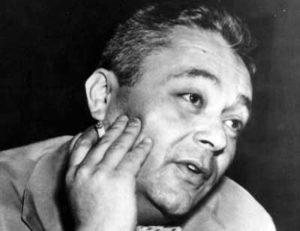 Jun 26: Romanian-born actor J. Edward Bromberg testifies before the House Un-American Activities Committee after he had been accused of being a member of the Communist Party. Bromberg refuses to tell the committee whether he was a Communist or whether he would help defend the U.S. in a war against a Communist adversary. He also refuses to discuss his membership in other organizations the HUAC claims are subversive. Instead, Bromberg attacks the committee for holding “hearings in the nature of witch hunts” where the “mere mention of a name” results in an actor being dismissed immediately. Bromberg is blacklisted, and friends notice that he ages considerably in a very short time. He goes to England to seek work, but will die by the end of the year from a heart attack, just short of his forty-eighth birthday.
Jun 26: Romanian-born actor J. Edward Bromberg testifies before the House Un-American Activities Committee after he had been accused of being a member of the Communist Party. Bromberg refuses to tell the committee whether he was a Communist or whether he would help defend the U.S. in a war against a Communist adversary. He also refuses to discuss his membership in other organizations the HUAC claims are subversive. Instead, Bromberg attacks the committee for holding “hearings in the nature of witch hunts” where the “mere mention of a name” results in an actor being dismissed immediately. Bromberg is blacklisted, and friends notice that he ages considerably in a very short time. He goes to England to seek work, but will die by the end of the year from a heart attack, just short of his forty-eighth birthday.
![]() Jun 26: The U.S. State Department instructs its Ambassador in Moscow to seek clarifications on the Soviet proposal for cease-fire negotiations in Korea.
Jun 26: The U.S. State Department instructs its Ambassador in Moscow to seek clarifications on the Soviet proposal for cease-fire negotiations in Korea.
![]()
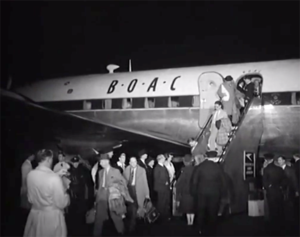 Jun 27: Britain has completed its evacuation of women and children from Abadan and other Iranian oilfields. The Anglo-Iranian Oil Company is now calling on its British staff to return to Abadan from the oil fields in case they will need to be evacuated. Britain warns Iran that it will hold the Iranian fully government responsible if any harm comes to British workers. The note also warns that the refinery will have to be shut down as soon as the storage facilities are full.
Jun 27: Britain has completed its evacuation of women and children from Abadan and other Iranian oilfields. The Anglo-Iranian Oil Company is now calling on its British staff to return to Abadan from the oil fields in case they will need to be evacuated. Britain warns Iran that it will hold the Iranian fully government responsible if any harm comes to British workers. The note also warns that the refinery will have to be shut down as soon as the storage facilities are full.
![]() Jun 29: The U.S. responds to the Soviet Union’s call for cease-fire negotiations with an invitation to the Communist forces’ command to meet on a Danish hospital ship in Wonsan harbor.
Jun 29: The U.S. responds to the Soviet Union’s call for cease-fire negotiations with an invitation to the Communist forces’ command to meet on a Danish hospital ship in Wonsan harbor.
![]()
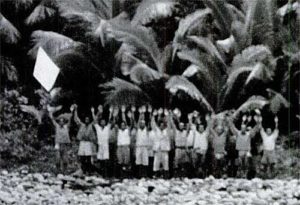 Jun 30: At least one war came to an end when nineteen Japanese sailors emerge from the jungle on the remote Anatahan Island in the Marianas. The sailors had been hiding on the island for seven years since their three small boats were sunk by U.S. dive bombers. The U.S. Navy on Saipan had been aware of their existence since 1946, and had made several attempts to contact the group. Earlier this month, a Navy expedition left 200 letters and pictures from their families in Japan. This finally convinced the sailors to surrender.
Jun 30: At least one war came to an end when nineteen Japanese sailors emerge from the jungle on the remote Anatahan Island in the Marianas. The sailors had been hiding on the island for seven years since their three small boats were sunk by U.S. dive bombers. The U.S. Navy on Saipan had been aware of their existence since 1946, and had made several attempts to contact the group. Earlier this month, a Navy expedition left 200 letters and pictures from their families in Japan. This finally convinced the sailors to surrender.
![]() Jun 30: The Alfred Hitchcock thriller Strangers on a Train is released. It is based on a novel by Patricia Highsmith and stars Farley Granger, Ruth Roman and Robert Walker.
Jun 30: The Alfred Hitchcock thriller Strangers on a Train is released. It is based on a novel by Patricia Highsmith and stars Farley Granger, Ruth Roman and Robert Walker.
![[Emphasis Mine]](http://jimburroway.com/wp-content/uploads/2018/01/McCarthyCohn.jpg)
